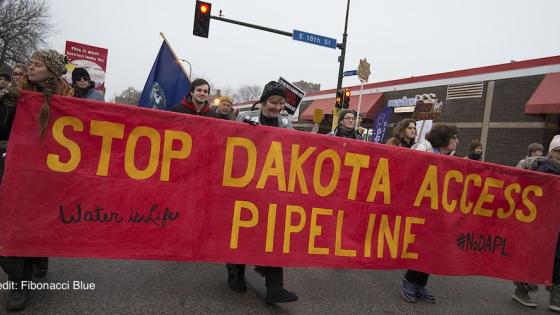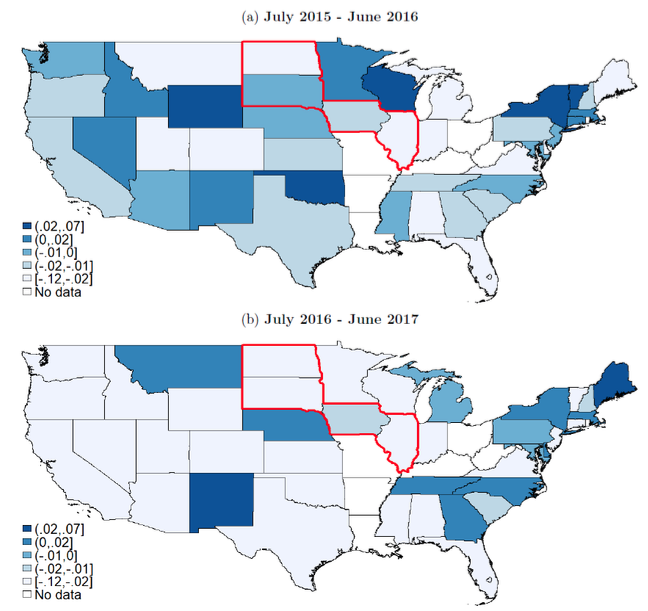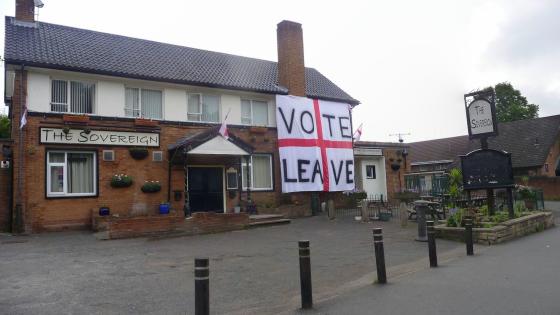While the banking system is essential to finance the global economy, it also makes unsustainable business activities such as coal mining and tax evasion possible (BankTrack 2017, Henry 2012). Banks can choose to internalise the social costs of these activities, or they must be regulated more strictly.
These externalities may even cause us to ask what banks are for (Hart and Zingales 2017). My recent research provides evidence of anew form of depositor disciplinethat forces banks to respond to the social preferences of depositors when choosing investments and policies (Homanen 2018).
From financial to civic discipline
Depositors discipline their banks either by withdrawing their deposits or by requiring higher interest rates (Martinez et al. 2001). We know that this behaviour is influenced by negative press reports (Hasan et al. 2013), regulatory signals (Iyer et al. 2013), social networks (Iyer and Puria 2012) and the perception that they are 'too big to fail' (Oliveira et al. 2014).
But customers in these cases are reacting only to the perception that they might lose money. If these depositors also reacted to non-financial information, it may have significant consequences for how banks choose to act.
The route of the Dakota Access Pipeline (DAPL) crosses the Missouri and Mississippi rivers, as well as burial grounds of the Standing Rock Indian Reservation. Before the pipeline was built, both environmental activists and Native Americans objected to the planned route.
Large-scale protests against the DAPL began in April 2016. The activists also coordinated against banks that were financing the DAPL. By February 2017 more than 700,000 people had signed one of six petitions addressed to the banks, representing more than $2.3 billion of deposits in checking, mortgage, and credit card accounts (BankTrack 2017). Many had already closed accounts, withdrawing more than $55 million. Protests took place outside branches around the country and some protestors chained themselves inside bank branches. During an NFL game between the Minnesota Vikings and Chicago Bears on 1 January 2017 in Minneapolis, Minnesota, two protestors hung a large banner from the roof of US Bank stadium. The bank is an investor in the pipeline company, and the banner demanded US Bank divest from the DAPL.
Identifying the effect of civic discipline
To test the effect of the depositor movement, I used the Federal Deposit Insurance Corporation (FDIC) summary of deposits data. It provides branch-level data for more than 100,000 branches across the US. Seventeen banks directly financed the construction of the DAPL. Citigroup, Bank of Tokyo Mitsubishi UFJ, BBVA, BNP Paribas, SunTrust Robinson Humphrey, TD Bank, Mizuho Bank, SMBC and Wells Fargo had had almost 11,000 branches in the US. These, known as the project financing banks, received much of the initial public attention.
Figure 1 shows heat maps of the DAPL financing branches. The darker the colour, the higher the deposit growth. From the FDIC data:
- July 2015 to June 2016: Before the banks were targeted by protesters, project financing bank branches were doing well across the US, with many having on average 0-7% higher deposit growth rates than other branches in the same state.
- July 2016 to June 2017: Once the bank protests started, DAPL branches across the US had lower deposit growth rates. Depositor activism seemed to affect branches nationwide.
Figure 1 Deposit growth rates in DAPL-financing banks, July 2015–June 2017
Source: Homanen (2018) using FDIC data.
Notes: Sample is 100,000+ FDIC-insured bank branches. States on route of DAPL highlighted in red. Darker colours indicate higher than state average deposit growth rates, lighter colours lower than state average deposit growth rates.
Economic effects of the protests
Depositors withdrew as much as $8-20 billion from the affected banks. On average, branches lost approximately 2% deposit growth, compared to the annual average of 8%.
Proximity to the pipeline was a significant contributor to this effect, as branches in pipeline states suffered more as a result of the event. Data from the Yale Program on Climate Change Communication and county-level measures of social capital suggests that depositor behaviour was influenced by climate change beliefs and local readiness for tackling societal challenges.
Savings banks, which tend to be more localised institutions with more transparent asset allocations than commercial banks, had increases in deposit growth. NGOs specifically urged their members to re-direct their funds to local savings banks and credit unions. Savings banks in counties with more DAPL financing banks had significantly higher deposit growth rates at this time.
The banks react
On 1 June 2017 the DAPL became operational, despite the protests. Nevertheless, banks including ABN-Amro and ING publicly re-evaluated their commitment to the project. ING, DNB and BNP Paribas sold their stakes in the DAPL.
Protests spread to the banks that provided corporate financing to the pipeline companies, as well as those financing the pipeline directly. The city of Seattle voted to end its contract on the city’s accounts with Wells Fargo, the Los Angeles City Council moved to divest from Wells Fargo, the city of San Francisco moved to divest $1.2 billion of investments in the companies and banks that were involved in DAPL, and numerous Norwegian pension funds divested from companies behind DAPL.1
US Bank promised to stop financing future pipeline projects (though it later reneged) and the Nordea, a bank headquartered in Denmark, decided to exclude three companies behind DAPL,2 which was partially due to the pipeline companies’ unwillingness to talk about these events.
In March 2018, following public pressure, Citizens Bank withdrew a multibillion-dollar line of credit to Energy Transfer Partners, one of the owners of the Dakota Access Pipeline.3
Going global
Global data on bank-specific scandals shows that this new form of depositor discipline is a much more general phenomenon. Combining scandals on tax evasion (Panama Papers), corruption (Libor-rigging scandals), and environmental scandals (the Carmichael coal mine project in Australia, for example) with a global, quarterly bank-level dataset, shows that total deposit growth decreases after scandals. DAPL was not a one-off.
Author’s note: A similar version of this article was previously posted in Chicago Booth ProMarket
References
BankTrack (2017), "Over 700,000 people demand banks stop financing the Dakota Access Pipeline," 3 February.
BankTrack (2018), "Banking on climate change", Fossil Fuel Report Card.
Hart, O and L Zingales (2018), "Companies should maximize shareholder welfare not market value", Journal of Law, Finance, and Accounting, forthcoming.
Hasan, I, K Jackowicz, O Kowalewski, and L Kozlowski (2013), "Market discipline during crisis: Evidence from bank depositors in transition countries", Journal of Banking & Finance 37(12): 5436-5451.
Henry, J (2012), "The price of offshore revisited: New estimates for "missing" global private wealth, income, inequality, and lost taxes", Tax Justice Network.
Homanen, M (2018), “Depositors Disciplining Banks: The Impact of Scandals”, working paper.
Iyer, R, and M Puri (2012), "Understanding bank runs: The importance of depositor-bank relationships and networks", The American Economic Review 102(4): 1414-1445.
Iyer, Ra, M Puri, and N Ryan (2013), Do depositors monitor banks?, NBER technical report.
Oliveira, R de F, R F Schiozer, and L A B de C Barros (2014), "Depositors perception of too-big-to-fail", Review of Finance 19(1): 191-227.
Martinez P, M Soledad, and S L Schmukler (2001), "Do depositors punish banks for bad behavior? Market discipline, deposit insurance, and banking crises", The Journal of Finance 56(3): 1029-1051.
Endnotes
[1] https://www.theguardian.com/us-news/2017/mar/17/sami-dakota-access-pipeline-norway-pension-fund-divest
[2] https://www.ft.com/content/8e481378-ef9d-11e6-930f-061b01e23655 and https://uk.reuters.com/article/us-energy-transf-lawsuit-nordics/nordic-investors-reject-dakota-pipeline-operators-allegations-idUKKCN1B928V
[3] https://earthfirstjournal.org/newswire/2018/03/04/after-months-of-protests-citizens-bank-ends-their-financing-of-dakota-access-pipeline-company/




